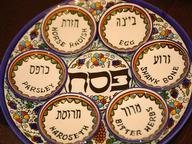Quiz Answer Key and Fun Facts
1. Kadeish (drinking the first cup of wine)
2. Urchatz (washing hands)
3. Karpas (dipping a vegetable in salt water)
4. Yachatz (breaking the middle matzah)
5. Maggid (retelling the Passover story, drinking the second cup)
6. Rach'tzah (second hand washing)
7. Motzi (blessing over bread)
8. Matzah (blessing over matzah)
9. Maror (eating bitter herbs)
10. Korech (eating the matzah/maror sandwich)
11. Shulchan orech (the meal)
12. Tzafun (eating the afikomen)
13. Bareich (blessing after meals, drinking the third cup)
14. Hallel (singing psalms, drinking the fourth cup)
15. Nirtzah ("Next year in Jerusalem!")
Source: Author
Kankurette
This quiz was reviewed by FunTrivia editor
looney_tunes before going online.
Any errors found in FunTrivia content are routinely corrected through our feedback system.
